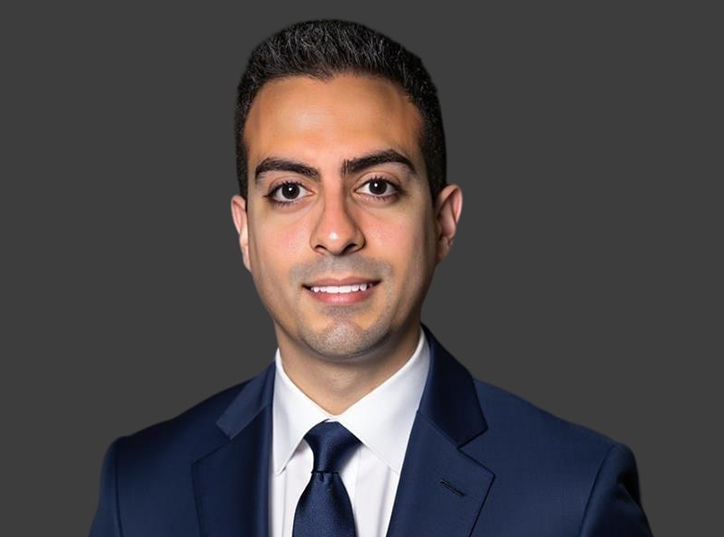From policy to patients: A student’s unconventional road to medicine

Peter Khoury once had a seat in the boardroom. Now, the aspiring dermatologist is headed to the exam room.
As a young boy, Khoury learned that timely, appropriate care could be difficult to find.
“Growing up, I had really refractory eczema.” Khoury said. “Access to care was a challenge in my community. Even once we found a dermatologist, it took time to find the right treatment. That experience stuck with me.”
His condition was especially difficult to manage as an athlete. Practices and games often meant dealing with cracked, inflamed and painful skin. He remembers feeling frustrated by the lack of relief. “It’s hard to feel like a normal kid when your skin is constantly flaring up,” he shared.
Those early struggles left an indelible mark on him not only because he lived with a chronic condition but also because he sometimes felt unseen by a health care system meant to serve and care for him. A fourth-year medical student at Kansas City University (KCU), Khoury still carries the impact of those early experiences with him. That perspective fuels his desire to be the kind of physician he needed back then.
He started college determined to become a doctor. But during his junior year at Penn State, he was appointed by then-Governor Thomas Corbett to serve as a trustee on the university’s Board of Trustees. The opportunity shifted his trajectory and opened doors to a decade-long career in health care consulting.
Khoury went on to advise some of the nation’s largest academic health systems, insurance companies and private equity firms. At Deloitte and KPMG, he led high-profile projects in clinical transformation, value-based care, virtual health, regulatory strategy and mergers and acquisitions. He held leadership roles across C-suite teams in the health care industry, including serving as the first Chief Revenue Cycle Compliance Officer at Yale at just 25. He also served as Chief of Staff to Deloitte’s U.S. Health Care Regulatory Leader in Washington, D.C.
“I had an amazing career,” he said. “But every time I was in a hospital, I kept thinking: it should be me in that white coat. I missed directly supporting patients with their care.”
That longing ultimately led him back to medicine. He applied to and was accepted into multiple medical schools — both allopathic and osteopathic — and chose KCU-Joplin after visiting the campus.
“KCU has more than 100 years of experience training community physicians,” Khoury remarked. “That legacy was important to me. I want to serve patients who don’t always have access and KCU’s mission reflects that.”
Today, his influence continues to grow. He is the first osteopathic medical student to receive a research grant from the Dermatology Foundation — a national honor recognizing his work to advance equity in dermatology. He co-authored a paper published in JAMA Dermatology exploring how the sharp rising cost of surgical treatment for hidradenitis suppurativa disproportionately affects low-income populations. His ongoing research examines how outcome-based payment models could improve access to dermatologic care, particularly for conditions like acne that are often undertreated among patients with limited resources in rural communities.
Additionally, the American Journal of Healthcare Strategy recently invited Khoury to write an article titled “From the Boardroom to the Patient Room: How Consulting Experience Can Shape Career Success in Medicine.” In the piece, he reflects on his consulting background and how it informs his approach to clinical care.
In one of medicine’s most competitive specialties, Khoury has quietly built a national presence — even before earning his DO credentials. He credits strong mentorship, collaborative research opportunities and a deep commitment to service for helping him find his place in the field. “I’ve been fortunate to work with dermatologists across the country who’ve supported my growth and invested in my development,” he said. “They’ve helped me learn, encouraged me to lead and opened doors I wouldn’t have found on my own. I hope to do the same for other students in the future.”
Khoury also serves on the American Osteopathic Association’s Bureau of Federal Health Programs, where he helps shape national policy conversations around health access and reimbursement. He holds additional leadership roles with the Health Care Compliance Association and sits on the Advisory Board of 24OurCare, a health tech care management company.
While his background in consulting includes policy and systems-level strategy, Khoury’s career goal now is straightforward: he wants to care for patients.
“People ask me if I want to run a health system someday,” he said. “Maybe in a few years. But right now, I want to take care of patients. I’m focused on becoming the best physician I can be.”
From battling a chronic skin condition as a child to influencing health policy, and now, training to become a physician, Khoury’s journey reflects a rare blend of lived experience and purpose. Wearing the white coat he once dreamed of, he steps into his final year of medical school eager to serve those who need it most — much like the young boy he once was, searching for answers, compassion and care.
